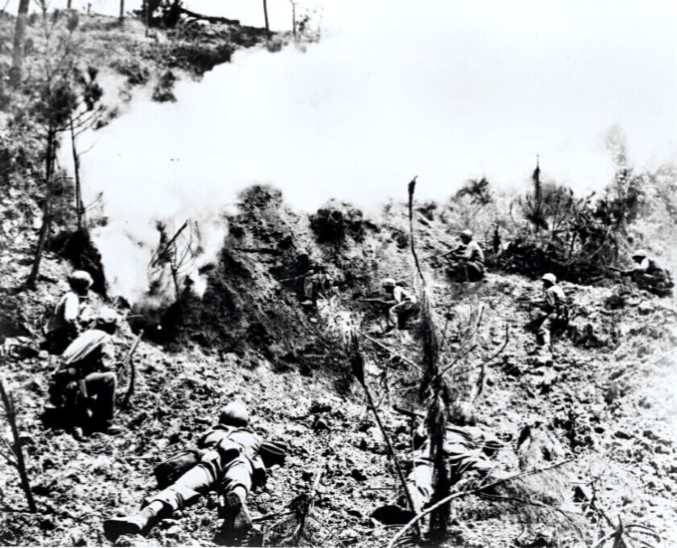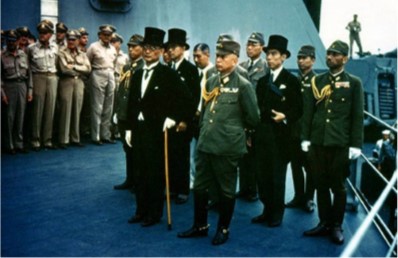A High Price
The book, “American Caesar” by William Manchester (a biography about General Douglas McArthur) is dedicated to the 29th Marines:
To the 29th Marines:
3,512 landed on Okinawa
April 1, 1945.
2,821 fell in 82 days, the
highest price ever paid by a U.S. Marine Corps Regiment
in a single battle.
Out of the original 3,512 Marines of the 29th Regiment that landed on Okinawa, 691 survived 82 days of front line combat. I was one of them. I do not know the casualty rate for replacements; many were killed or wounded before we even knew their names.
Hell and Misery
During the 82-day battle for Okinawa, we wore the same clothes, the same underwear, and the same socks we had on when we landed. We could not shower or shave. We did not have toothpaste, only a toothbrush and a spoon that we licked clean. We lived on rations the entire time, not one hot meal during the three months it took us to take Okinawa. We heated instant coffee in our canteen cups.
Combat is hell beyond belief; life is indescribably miserable. We lived at night in shallow graves called foxholes. We fought in the rain, the mud, the cold, and the heat while trying to live for tomorrow. We slept in two-hour shifts every night because the Japanese fought their best at night. Death is real, every minute of every hour, day and night. Chances are good you will be killed or wounded. There were times when death would have been preferable to living. I was prepared to die, having made my peace with God. I prayed a lot, as did others. I got to know God. We did not use profanity as portrayed in most movies; we wanted to be in God’s good grace in case we were killed.
No Guilt
I have no remorse for killing Japanese soldiers. Hate ran so deep that it gave me great satisfaction to do so. Japanese officers are taught to decapitate a person’s head with one stroke of their samurai sword.
Over 95,000 Japanese lost their lives on Okinawa, as well as an estimated 75,000 to 100,000 civilians. The U.S. suffered some 50,000 casualties with more than 12,500 killed.
I served as an “Infantry Assault Demolitionist.” In the 21-day battle for Saipan, few opportunities presented the need, but in the 82-day battle for Okinawa, there were many opportunities. Life expectancy of a demolitionist is short. How I survived I do not know.
 Sixth Division Marines blasting caves on Okinawa
Sixth Division Marines blasting caves on Okinawa
I was part of a fire team; I would have to get close enough to toss a twenty-pound satchel of explosives inside a cave or pillbox. We would always be under covering fire of our BAR (Browning automatic rifle) man. Other times our flame thrower would try to get close enough to burn it, and then I would toss the explosive charge. I had fifteen seconds from the time I armed the fuse until the satchel charge exploded. On caves that were hard to access, I would use a missile launcher known as a “Bazooka” to fire a missile into the cave. There is no way of knowing how many Japanese soldiers or civilians were in the caves I sealed close. I have no remorse or even any feeling of guilt. I learned to hate the Japs, and it was a feeling of satisfaction.
Thanks and Promises
I have considerable combat time because the only time I was not in the lines was the 36 hours I was hospitalized. I escaped death or being wounded many times. Was it by the Grace of God that I lived, while others were killed? I give thanks to God every day and remember those who did not survive. I made promises to God that I still keep and honor.
The people of these United States do not realize the blessing of living in such a great country!
As soon as the battle was over, we boarded the USS McCracken for Guam where we were to train for the invasion of Japan in February 1946. The 6th Division, along with the 1st and 2nd Marine Divisions, was to land at Tokyo Bay.
It was paradise to have showers, hot food, and especially a bunk to sleep on. How thankful we were to have such simple things of life and to be here to enjoy them. I had earned my second battle star and a Presidential Unit Citation.
Japanese Surrender
The fly boys from Tinian were taking bets the war would be over in two weeks. The atomic bomb on Tinian was not so secret! Still it was a bet that anyone would be glad to lose. One evening I was sitting on a coconut log watching an outdoor movie, when it was announced that a single bomb had destroyed an entire city in Japan. It was hard to believe, and the next few days were like science fiction trying to believe that such a weapon existed.
 Japanese representatives on board the USS Missouri preparing to surrender, 9 September 1945
Japanese representatives on board the USS Missouri preparing to surrender, 9 September 1945
Japan surrendered 14 August 1945 after a second atomic bomb was were dropped on the country. After taps that day, we learned that Japan would accept unconditional surrender. The band played the Marine Hymn, and we marched in the company street, cheering wildly. The war was over! We would be going home!
Or rather we thought we would be going home! Instead we were sent to North China to accept the surrender of the Japanese forces. We sailed aboard the USS Brookings (APA 140), stopping en route at Saipan. As I looked for the last time at the big mountain we had captured months earlier, my thoughts went to the names of those we had buried in the Division cemetery. I bid a last farewell as we sailed away. It was strange sailing on a ship with so many lights on at night. I remember wondering if every Japanese submarine commander knew the war was over.
China
We were to land at Chefoo in northern China, but the Chinese Communist, who was now fighting a civil war with the Chinese Nationalist, denied us permission to land there. Instead we landed at Tsingtao, China on 28 September 1945. I had suffered from bronchitis all my life, and the Corpsman gave me a pill that he told me was opium. I have never had another attack of bronchitis since!
After a brief stay in Tsingtao, we boarded the USS Rockbridge for Chinwangtao, China near the Great Wall. I did not get to see the wall, as the Nationalist and Communist were still fighting, and we were in the middle. A few Marines who attempted to see the Great Wall were captured by the Communists and held until a diplomatic release was obtained.
We were housed in a former tuberculosis hospital with Japs in one wing and Marines in another. Occasionally we would pass in a hallway; it was tough confronting the very Japanese who had committed so many atrocities in the war. When we met, they would stand aside and bow as we passed. I usually offered a few choice words, and I think they understood the intent — my words were not complementary.
In a formal surrender ceremony before the entire 6th Marine Division, the Japanese officers laid down their swords and the soldiers laid down their rifles. They were then sent home to Japan. There is a photo of the ceremony in the 6th Marine Division history book.
In China, we could ride in a rickshaw for ten cents and buy English liquor for twenty-five cents. Inflation was so high, the exchange rate was three thousand yen to one U.S. dollar. But China was still primitive, and there was not much to do while on liberty. I was especially homesick that Christmas in 1945. The war had been over for five months. The Japanese forces in China had returned to Japan. But they wanted us to stay and support the Nationalist against the Communist.
Sentimental Journey
Finally, in February 1946 after twenty-six months overseas, I learned that I was going home! The reality set in when they played the song “Sentimental Journey” over the speaker system. I still get goose bumps when I hear that song.
We turned our weapons over to the Nationalists and boarded a train for Taku, China where we boarded the former luxury liner SS Manhattan — renamed the USS Wakefield — bound for San Diego. It was a thirty-thousand-ton ship with three thousand Marines aboard. During a storm we took a 45 degree list, the largest list the ship had ever taken. (This was before stabilizers that cruise ships have today to prevent such listing.)
Back Home
After about two weeks at sea we arrived at San Diego where we received the largest “Welcome Home” of any troopship from the Pacific. Sailors in white uniforms were lining the decks of ships. Fireboats were sounding their siren and spraying water, and cute girls in a boat were circling the ship. Dockside there was a Marine band playing the Marine Hymn, and some family members waiting. I came down the gangplank and kissed the ground, I was so happy to be back on U.S. soil, which I didn’t know if I would ever see again.
Seventy-two hours later I was a civilian. I boarded a train for Dallas, and when I arrived at Union Station I took a street car home, still wearing my wrinkled green uniform and toting a sea bag. It seemed strange that no one spoke or seemed to care that I had been to war. Dallas looked like the same peaceful place, as if there had never been a war. Most service men had already returned to civilian life, and it was probably not unusual to see servicemen returning home.
I surprised my Mother and she cried. She said she prayed every day for my safe return. My girlfriend had married, my friends had married, and it was lonely for a while adjusting to civilian life.


